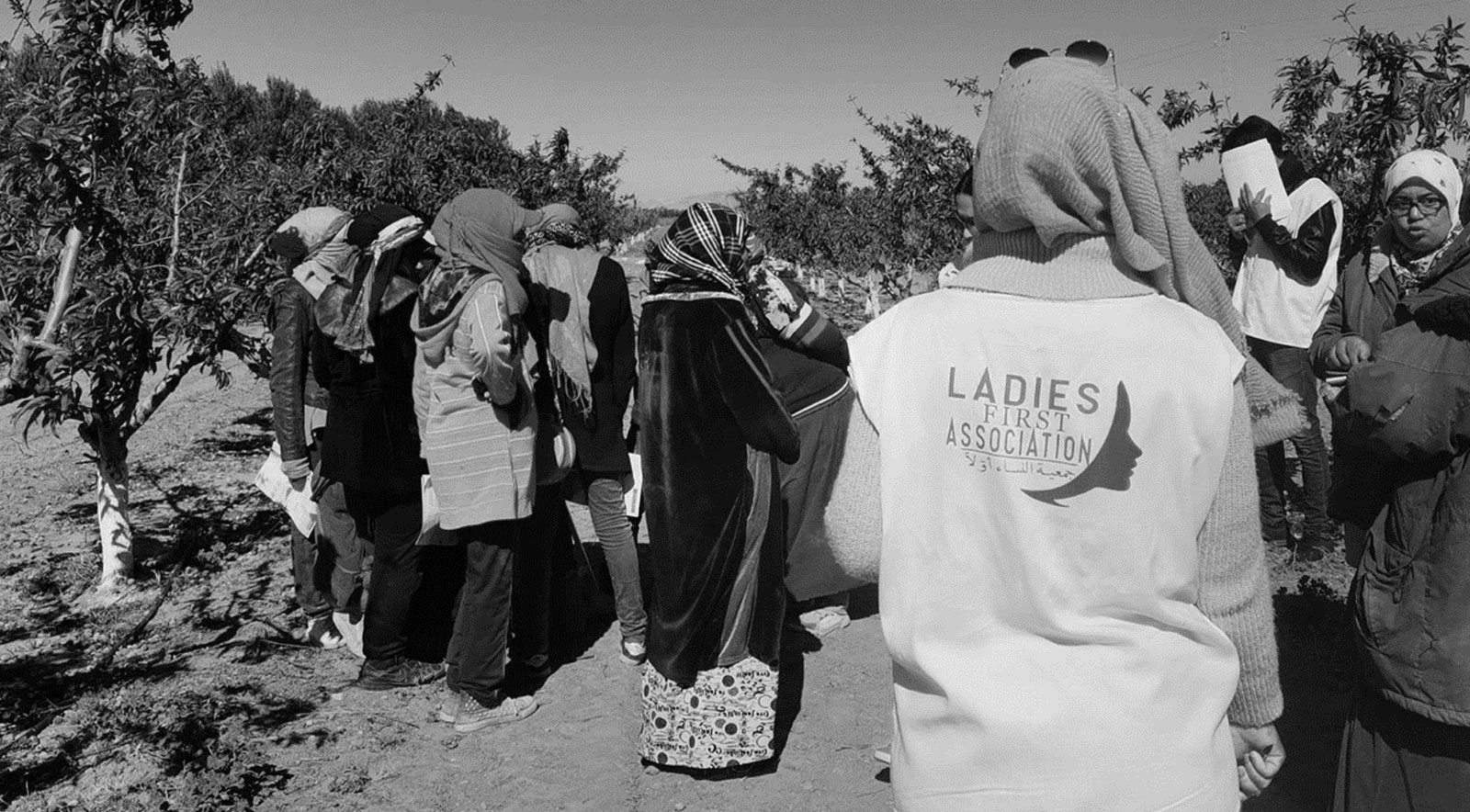
“We work to protect women’s lives and to protect them from discrimination. We work with all vulnerable women, including illiterate and educated women. Our objective is to create real and durable changes in their lives,” says Hayat Kadri, President of the Ladies First Association speaking with EED.
Working out of Regueb, a small town in the Sidi Bouzid governate of central Tunis, Hayet and her colleagues are a world away from the busy seaside resort of Sfax, just 90 kilometres to the East. The birthplace of the Tunisian revolution, Sidi Bouzid is a poor agricultural region where many live in precarious economic conditions. There have long been public demands of the authorities to provide for better protection of rural workers’ social and economic rights, yet traditionally few civil society organisations have existed to advocate or work for such reforms.
Local women are a particularly vulnerable population, making up nearly two-thirds of all seasonal agricultural workers. They are paid low wages and they have little to no access to social security. Their work conditions are hazardous, with women travelling back and forth to work in accident prone trucks and constantly exposed to dangerous pesticides. Compounding these challenges, nearly half of all women in the region are illiterate.
Hayat describes the beginnings of Ladies First as spontaneous with the association starting off its work in a volunteer capacity in 2019, as they worked in partnership with state structures to provide services badly needed by women and to help vulnerable women.
“We provided breast check services, we ran literacy classes, and we ran awareness campaigns about domestic violence. We helped set up the first social enterprises in the region by providing women artisans with management and finance training,” says Hayat. “We did all of that work with zero funding.”
In March 2020, the Association received its first small grant to run an awareness campaign about violence against women in the public arena within the universities. The onset of the Covid-19 pandemic meant they had to change tack to focus on Covid-19 prevention and awareness raising.
It was in June 2020, that Ladies First received its first institutional funding, when EED provided them with a grant to set up an ‘Observatory for Social and Economic Rights’ to help develop a local monitoring, awareness raising and advocacy mechanism to protect local female workers of the region. The association trained up staff on women’s rights, economic and social rights, and on monitoring and documenting human rights violations, and carried out an awareness campaign to encourage agricultural workers to subscribe to the state social protection programme.
The Observatory also carried out its first research study on the conditions of rural agricultural workers.
“We wanted to know who they are? What they do? Why these women work in the fields. One of the interesting findings of the study was that it is not just uneducated women take on this work; there are also many educated women and university graduates. There is no other employment open to them. If they need money, farm work is the only option,” she says.
The Observatory has since carried out four further studies, and their findings are used by local ministries in informing their work and have been picked up by the media.
In addition to the Observatory, Ladies first also runs a ‘Legal Listening and Guidance Center’, which provides assistance to survivors of domestic abuse, and a ‘Hopeful Literacy Centre for Women’, run in partnership with the Ministry of Social Affairs.
Its literacy classes are giving new opportunities to previously illiterate women, who are now able to assist their school-going children. Many graduates have gone on to attend social entrepreneurship programmes also run by the association and launch their own mini businesses. Hayat tells of one woman who escaped an abusive marriage and now runs her a small confectionary business. There are many such stories.
Ladies First is also providing new work opportunities to educated women, many of whom had no job prospects previously. The group’s director of finance is one of their success stories. A holder of a master’s degree in international finance, she too was once an agricultural worker with no employment prospects. She began working with Ladies First as part of the EED project.
Hayat acknowledges that Ladies First now has a wide remit, working in health, education, legal rights, domestic abuse situations and in social and economic empowerment. But she insists that, “women remain at the centre of what we do.”
“This work has also changed my life,” she says. “I see life with a new vision and new hope and this is reflected in my private life. I am not just an ordinary woman. I bring the energy from my work back to my family and my daughters are proud of me.”
This article reflects the views of the grantees featured and does not necessarily represent the official opinion of the EED.